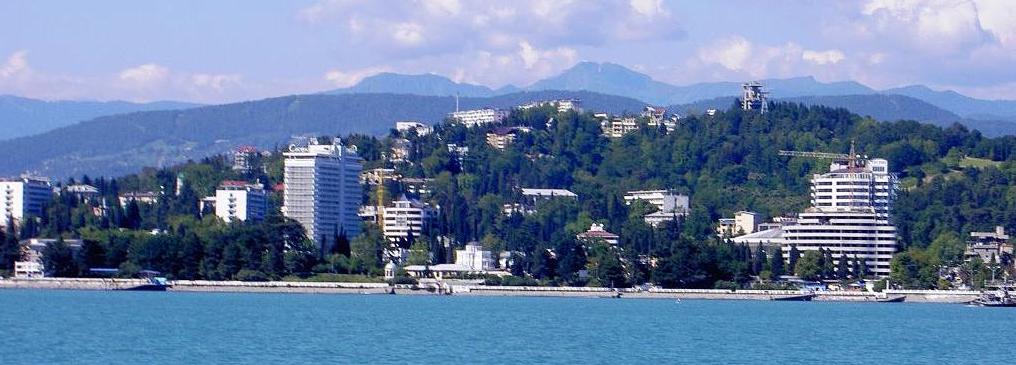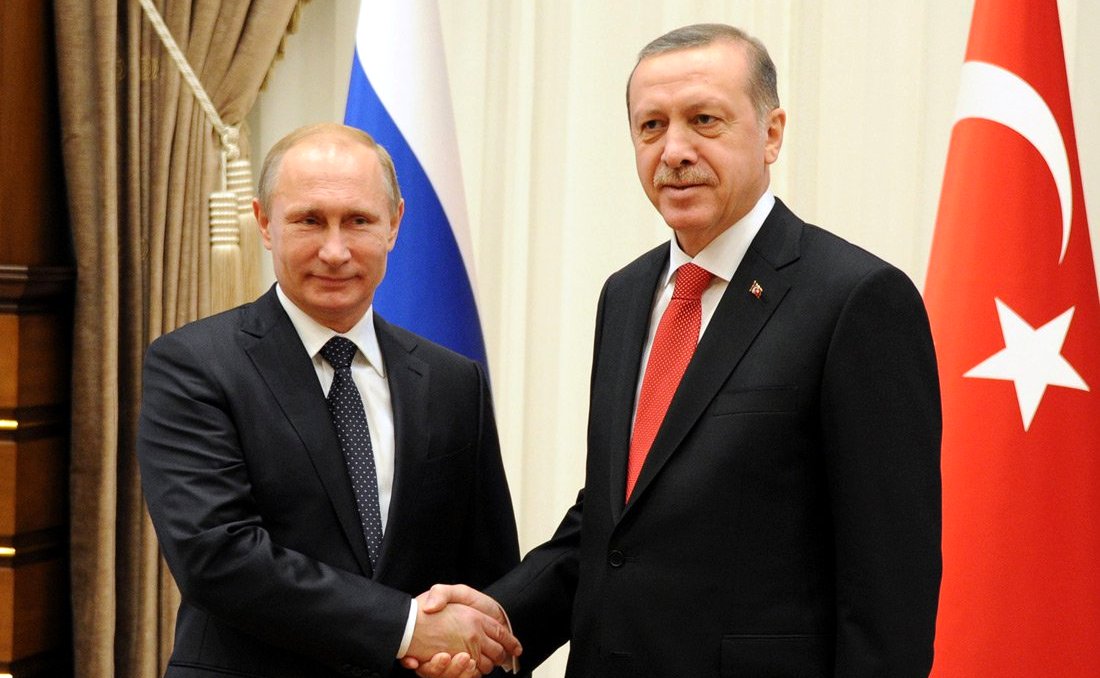Despite the high-speed impression created by events in the past few weeks, the shifting trends of Russian and U.S. influence on the region have been underway for years.

Sochi, Russia, as viewed from the Black Sea. (Wikimedia Commons)
By Patrick Lawrence
Special to Consortium News
 Rarely do world events move at the velocity they now assume in the Middle East. President Donald Trump announced the withdrawal of American troops from northeastern Syria the evening of Oct. 6. Russian President Vladimir Putin and Turkey’s President Recep Tayyip Erdogan met for six hours in Sochi, Russia, last Tuesday. That comes to 16 days. When the Russian and Turkish leaders finished talking, the power balance in Syria shifted 180 degrees.
Rarely do world events move at the velocity they now assume in the Middle East. President Donald Trump announced the withdrawal of American troops from northeastern Syria the evening of Oct. 6. Russian President Vladimir Putin and Turkey’s President Recep Tayyip Erdogan met for six hours in Sochi, Russia, last Tuesday. That comes to 16 days. When the Russian and Turkish leaders finished talking, the power balance in Syria shifted 180 degrees.
After eight years of American subterfuge, Washington has all but surrendered its foothold — its illegal foothold — on Syrian soil. In the best outcome, Russia and other allies of the Damascus government will now advance toward a post-conflict settlement unhindered by the covert “regime change” programs the Pentagon and the CIA have long mounted against President Basher al–Assad. And as Russia extends its influence beyond Syria — a project already under way — the dynamic in the world’s most conflicted region stands to change more fundamentally than it has since the U.S. assumed the imperial mantle from Britain after the 1956 Suez crisis.
While this prospect appeared to open in the course of a single day’s negotiation, there is nothing sudden about the rise of Moscow’s influence in Syria and the decline of Washington’s. This shift began when Russian bombers flew their first sorties over Syria on Sept. 30, 2015 at the Syrian government’s invitation and after Barack Obama declined Putin’s invitation to join the mission against jihadists in Syria. Putin and Sergei Lavrov, his able foreign minister, have since proven exceedingly adept and highly principled as they explore diplomatic avenues to stabilize the Syrian government and achieve a negotiated peace settlement. What transpired in Sochi was merely the latest of many steps in this process.

Russian President Vladimir Putin and Turkey’s President Recep Tayyip Erdogan during a Russian state visit to Turkey, Dec. 1, 2014.
Multi-Sided Talks
There are two things to note here. First, we do not witness a straight-line change of the guard in Syria, one outside power replacing another. U.S. objectives in Syria have been patently malign since it began covertly arming Sunni-nationalist jihadists in early 2012 at the latest: It has sought to keep Syria divided and in a state of chaos while backing Islamist proxies to bring down Assad’s secular government in a violent coup. Russia’s intentions are diametrically the opposite: to restore Syria’s territorial integrity while encouraging multi-sided talks intended to produce a lasting peace.
Second, Moscow’s emerging role in the Middle East is studied, the consequence of careful planning and astute statecraft. Since Russia’s entry into the Syrian conflict four years ago, Putin and Lavrov have assiduously developed working relations with nations of very disparate interests, from Turkey and Iran to Saudi Arabia and Israel. The Tehran Times reported last Wednesday that Russia intends to propose a regional security framework by the end of this year. The Iranian daily quotes Mikhail Bogdanov, Lavrov’s deputy foreign minister, as saying this endeavor has been in train since last June.
If any such effort gains support and momentum — and Moscow will seek backing among the major world powers as well as in the region, Bogdanov indicated — it could open the door to a fundamental shift away from the conflict, disorder, and sectarian animosities that have long plagued the Middle East.
The Sochi Agreement
The agreement Putin and Erdogan reached in the Black Sea resort city last week has a number of moving parts. Turkey has halted the offensive Erdogan set in motion Oct 9. Russian and Turkish troops are now to police a buffer zone 270 miles long and 18 miles deep along the Turkish–Syrian border. The Syrian Arab Army has re-entered the nation’s northeastern quadrant for the first time since the U.S. sequestered the region in 2012. The Kurdish-led Syrian Democratic Forces, which Erdogan considers a threat to national security, are required to withdraw southward into Syria.
This agreement has its critics. John Helmer, a longtime Moscow correspondent, reported last week that a considerable section of the Russian administration — the defense and foreign ministries, the general staff, the intelligence apparatus — think Putin gave too much away during his summit with Erdogan in Sochi. “The big fact on the ground … is that Putin has agreed to another Turkish invasion of a neighboring country,” Helmer noted. “In the run-up to the negotiations in Sochi, this was not the Russian policy consensus toward the Turkish invasion of northern Syria, nor toward the options for driving the Turks back where they belong.”
Helmer’s report is accurate, surely, but this argument lacks long-term perspective. Putin’s intent has been clear since Erdogan announced his plans for an imminent incursion. On one hand, Putin acknowledges the need to assuage Edrogan’s anxieties about Kurdish militias along Syria’s border with Turkey. On the other, he asserts the principle of territorial integrity as fundamental to any stable post-conflict settlement in Syria.

Kurdish YPG fighters, March 2018. (Kurdishstruggle/Flickr)
Interim Step in Long Process
The Turkish presence in Syria that Putin green-lighted in Sochi, in other words, is an interim step in a more comprehensive diplomatic process. At the moment Turkish troops in Syria are illegal; Putin’s objective is to bring Ankara and Damascus together such that Assad will formally confirm their presence as he has Russia’s (and Iran’s) for the past four years.
“Only if Syria’s sovereignty and territorial integrity are respected can a long-lasting and solid stabilization in Syria be achieved,” Putin said as he stood next to the Turkish leader at a press conference after their talks. “It is important that our Turkish partners share this approach. The Turks will have to defend peace and calm on the border together with the Syrians. This can only be done in the atmosphere of mutual respect and cooperation.”
The New York Times ran a remarkable report on the Putin–Erdogan summit last Wednesday. The headline in the print edition tells the story — “Putin and Turks Carve Up Syria After U.S. Exit” —and the story could scarcely be more misleading. The U.S. carved up Syria when it enlisted the Kurds to break off the northeast in 2012 and prevented the Syrian army from entering the region. When Syrian troops reentered the northeast alongside Russia’s last week, Damascus took a major step toward the reintegration of the nation.
As things now appear, Russia may also have brought the years of Washington’s “regime change” operation in Syria to a decisive close. But this cannot yet be counted a certainty. There remains the chance that the U.S. will once more make use of proxies to stage another false-flag chemical weapons incident, so justifying a missile strike or the reentry of U.S. ground forces.
There are already ominous developments in this connection. Last Tuesday the Trump administration authorized $4.5 million in funding to the White Helmets, the notoriously phony “civil defense” group known for its ties to jihadist militias and its many operations as an agent provocateur. On Saturday it emerged that a U.S. convoy of armored vehicles and troops was advancing from Iraq into southeastern Syria. The Trump administration justified this as a move to protect Syrian oil fields; Moscow termed it “banditry.”
Over the weekend, a Special Operations force raided an Islamic State refuge in northwestern Syria. Trump said Sunday that Abu Bakr al–Baghdadi, the ISIS leader, was killed in the operation. This may or may not be true: Who knows any longer when Washington is telling the truth and when it is lying? But the raid was almost certainly intended to signal that Washington is not done with Syria.
Having unleashed this exceptional chain of events when he announced the withdrawal of U.S. troops three weeks ago, Trump is now floundering — stuck, as so often, putting the best face on developments that have spun out of his control. It is already clear the withdrawal he trumpeted will be partial at best. In remarks following Putin’s Sochi summit with Erdogan, Trump came over as nothing so much as a deluded dictator. “This was an outcome created by us, the United States, and nobody else, no other nation,” Trump declaimed. Pitiful is the only word for this.
If the American press is consistent in its derelictions of duty, there will be little or no coverage of Russia’s Middle East security initiative when Moscow makes it public in months to come. This will have nothing to do with its potential significance. Viewed in the broadest terms, the undertaking stands to signal a major advance — a step toward an era when American power in the region is gradually eclipsed, and the non–West asserts its preference for post-imperial solutions to its assorted conflicts and challenges.
Patrick Lawrence, a correspondent abroad for many years, chiefly for the International Herald Tribune, is a columnist, essayist, author and lecturer. His most recent book is “Time No Longer: Americans After the American Century” (Yale). Follow him on Twitter @thefloutist. His web site is Patrick Lawrence. Support his work via his Patreon site.
If you value this original article, please consider making a donation to Consortium News so we can bring you more stories like this one.
Before commenting please read Robert Parry’s Comment Policy. Allegations unsupported by facts, gross or misleading factual errors and ad hominem attacks, and abusive or rude language toward other commenters or our writers will be removed. If your comment does not immediately appear, please be patient as it is manually reviewed. For security reasons, please refrain from inserting links in your comments.
>>Please Donate to Consortium News’ Fall Fund Drive<<

“Moscow’s emerging role in the Middle East is studied, the consequence of careful planning and astute statecraft.” That says it all. Since Trump, there is no strategic plan, only chaos, in American diplomatic activities. Between Trump and Pompeo, they have seriously wounded US statecraft capabilities by driving out seasoned pros and terrorizing whomever has remained. That this is the sorry state of the State Department is quite evident by the number of officials eager to lend a hand in impeaching Trump. They do not see this as political sabotage but as their sworn oath as federal employees.
Excellent article. Thank you, Patrick
Is the world going to let the US get away with what can only be called bare faced theft while we inflict pain and suffering on innocent people?
Pretty sad but those who inflict pain and suffering on other countries know full well that they will never be held accountable. Has the US ever been held accountable in the past? Last time I looked, George Bush was sitting in the owner’s box at Texas Stadium watching the Dallas Cowboys with Ellen DeGeneres. Pretty sickening on so many levels.
Smooth. If I read this right, “territorial integrity” and “sovereignty” aren’t bright lines after all. Like the definition of “terrorist”, they’re malleable, depending on point of view. Even one form of “illegal” is ok, another not. And the US president is now “nothing so much as a deluded dictator”? What happened to his wise policies, and his being the naïve victim of a rogue national security apparatus? Finally, will Syrian civilians EVER be given agency and a voice in narratives contrived by non-Syrians? It would be decent as well as intellectually not-bankrupt.
Lawrence has put his finger on a principle that “exceptionalist” Westerners have been missing for several years, and that is national sovereignty. Think back to what Putin said at the UN General Assembly a few years ago – a speech probably crafted by Lavrov who is, as Lawrence says, very able. Even if one is suspicious of Russia’s record – people will cite Crimea but there was a fair and decisive self-determination vote – there is no doubt that the message of respect for sovereignty, backed by actions, resonates with many nations in the world and is, not by accident, a sharp contrast with America’s total disregard for sovereignty. I hope there is no need for me to recount to CN readers the myriad ways in which the USA is the leading rogue nation in the world and violator of sovereignty.
Readers might also want to recall several episodes in the so-called Syrian Civil War when Russia, and Lavrov, arranged cease-fires only to have Kerry (and others) sabotaged by the Pentagon. Depending on how Syria and the wider region of West Asia are sorted out, Lavrov should be considered for the Nobel Peace Prize.
Trump may be triangulated between good military advisors who want us to defeat ISIS and get out and Deep State military advisors who want us to stay forever, remove Assad, and control oil. He has killed Al Baghdadi in order to remove the ISIS reason for staying. And he has blatantly expressed the Deep State policy to control the oil and opened it to ridicule. I think he is acting in support of common sense and in support of the policy so well documented by Patrick Lawrence in this essay.